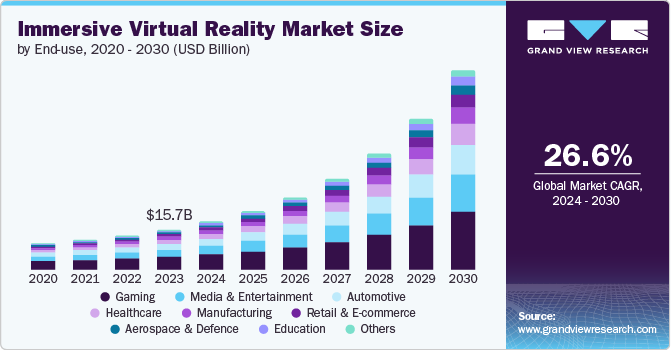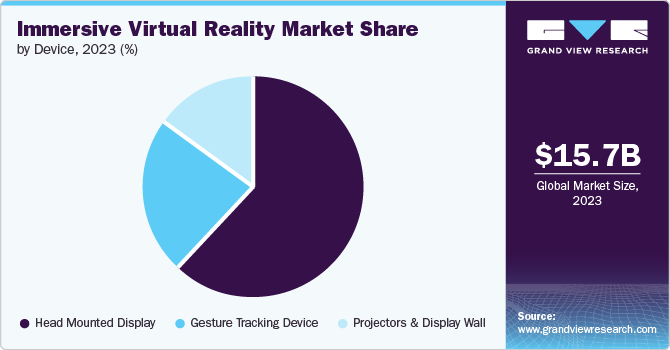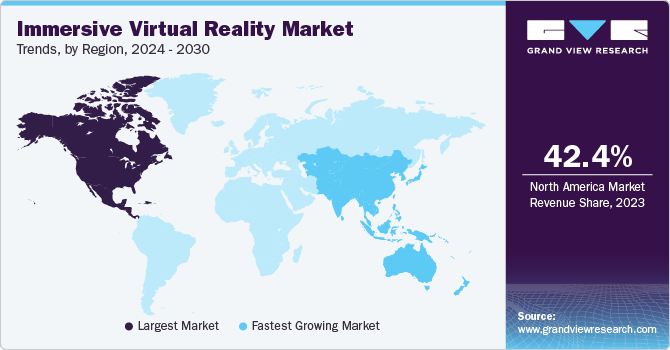- Home
- »
- Next Generation Technologies
- »
-
Immersive Virtual Reality Market Size & Share Report, 2030GVR Report cover
![Immersive Virtual Reality Market Size, Share & Trends Report]()
Immersive Virtual Reality Market (2024 - 2030) Size, Share & Trends Analysis Report By Component (Hardware, Software), By Technology, By Device (Head Mounted Display, Gesture Tracking Device), By End-use, By Region, And Segment Forecasts
- Report ID: 978-1-68038-675-2
- Number of Report Pages: 100
- Format: PDF
- Historical Range: 2018 - 2022
- Forecast Period: 2024 - 2030
- Industry: Technology
- Report Summary
- Table of Contents
- Interactive Charts
- Methodology
- Download FREE Sample
-
Download Sample Report
Immersive Virtual Reality Market Summary
The global immersive virtual reality market size was estimated at USD 15.7 billion in 2023 and is projected to reach USD 77.2 billion by 2030, growing at a CAGR of 26.6% from 2024 to 2030. Immersive Virtual Reality (VR) technologies are gaining popularity in multiple sectors such as entertainment, healthcare, education, and automotive.
Key Market Trends & Insights
- North America dominated the global immersive virtual reality market with the largest revenue share of 34.6% in 2023.
- The immersive virtual reality market in the U.S. led North America and held the largest revenue share in 2023.
- By component, the hardware segment led the market, holding the largest revenue share of 48.4% in 2023.
- By technology, the non-immersive segment held the dominant position in the market and accounted for the leading revenue share of 83.2% in 2023.
- By device, the gesture tracking device segment is expected to grow at the fastest CAGR of 23.3% from 2024 to 2030.
- By end use, the healthcare segment is expected to grow at the fastest CAGR of 9.7% from 2024 to 2030.
Market Size & Forecast
- 2023 Market Size: USD 15.7 Billion
- 2030 Projected Market Size: USD 77.2 Billion
- CAGR (2024-2030): 26.6%
- North America: Largest market in 2023
The progress in VR technology and the rising accessibility of VR content are other propelling factors for the growth of the global immersive virtual reality market.

Technological advancements have led to better graphics in Virtual Reality (VR), making it more accessible and affordable. Improved graphics and latency reduction have further improved the market growth. The immersive virtual reality market has expanded beyond the boundaries of gaming as it is used in different industries, such as healthcare for surgical practice, education for interactive learning, real estate for virtual property tours, and businesses for virtual collaboration and training sessions. Furthermore, increased investments in developing an immersive virtual reality market have led to significant market growth.
Component Insights
The hardware segment dominated the market and accounted for a market share of 48.4% in 2023 due to the technological improvements in VR hardware with improved performance, graphics, and display of Virtual Reality (VR) devices. Improvements in the resolution of displays and faster refresh rates have also improved the immersive VR experience. The increase in production volume has made VR devices affordable, which has further contributed to the market growth of this segment. Therefore, the improvement in the components of VR devices and affordability are the key growth factors of this market segment.
The software segment accounted for a market share of 34.9% in 2023. This is due to the increase in the applications of Virtual Reality (VR). The increase in the requirement for VR software in the fields of gaming, medicine, and education has contributed to the market growth. There is also an increased use of VR software in content creation as the software is used in development tools for creating VR content. The market growth is also attributed to the increased use of VR software in the automotive and architecture industries, as it is used for immersive visualization and testing.
Technology Insights
The semi and fully immersive segment dominated the market and accounted for a share of 83.2% in 2023. This is due to the increased accessibility and technological advancements in the segment. The market growth has increased due to improved VR experience and advances in hardware, such as better-resolution displays, responsive haptics, and tracking systems. With developments in software VR, the technology has become more mainstream, which has made these devices more accessible and affordable, further driving the market growth. The major drivers for the development of this segment are the entertainment and gaming industries, as fully immersive VR devices are famous for gaming and movie consumption.
The non-immersive segment had a market share of 16.7% in 2023. This is due to the accessibility and affordability of the devices. The non-immersive VR experience, available through standard screens like mobiles and desktops, provides a more accessible entry point for users without the resources or interest for fully immersive devices.
Device Insights
The head-mounted display segment dominated the market with a share of 62.1% in 2023. This is due to the high demand for head-mounted displays in applications such as PC games, consoles, and smartphones, which fuels the HMD market. The key market players also contribute to the market growth by releasing additional products and software compatible with each other in the Virtual Reality (VR) segment. The market growth is also attributed to the increased use of head-mounted displays in engineering, medicine, and architecture that use VR devices for immersive experiences.

The gesture-tracking device cans segment accounted for a market share of 23.3% in 2023 due to increased demand for gesture features for a more intuitive experience in virtual environments. Gesture tracking devices allow the user to interact with the virtual world with the help of hand and body gestures, creating a more immersive experience. The integration of gesture-tracking features in Virtual Reality (VR) devices has increased with technological advancements in this market, further contributing to the market growth.
End-use Insights
The gaming segment dominated the market with a share of 32.1% in 2023, attributed to the increase in investment by companies in new VR products. The market continually evolves, and the gaming community constantly seeks more realistic and engaging experiences. The gaming industry is also growing with the advancements of VR devices in immersive gameplay and graphics. Furthermore, affordability and the increase in the availability of VR devices have contributed to the segment growth.
The healthcare segment accounted for a market share of 9.7% in 2023 due to the rise in immersive VR technology for surgical procedures, telemedicine, medical training, and patient education. Companies are also implementing new solutions, such as VR distraction therapy platforms, to enhance patient comfort during painful medical treatments. Therefore, these factors contribute to the segment growth.
Regional Insights
North America dominated the immersive virtual reality market with a share of 42.4% in the year 2023. It is attributable to the presence of key market players in the software and hardware industry in the region. With the strong presence of the gaming community in the area, the demand for immersive VR devices is increasing significantly. The market growth in this region is also attributable to the rise of the implementation of immersive VR in the medical and military industries.

U.S. Immersive Virtual Reality Market Trends
The immersive virtual reality market in the U.S. accounted for a market share of 77.5% in 2023 due to the presence of major tech companies and their heavy investments in innovations related to software and hardware. Investment in this sector has provided a dynamic environment for innovation, which supports the expansion of this segment. The market growth in this country is also attributable to the government's implementation of immersive VR in military operations.
Europe Immersive Virtual Reality Market Trends
Europe immersive market was identified as a lucrative region in this industry, with a market share of 22.4% in 2023 due to the significant use of immersive technology in education and healthcare sectors. The healthcare systems incorporate immersive technology for patient care and medical training for surgical training. With the growth of the gaming industry, there has been a rise in the incorporation of immersive VR devices to improve the gaming experience.
The UK immersive virtual reality market is expected to proliferate in the coming years due to the strong presence of the gaming community, which has increased the demand for immersive VR devices.
Asia Pacific Immersive Virtual Reality Market Trends
Asia Pacific immersive virtual reality market is anticipated to witness significant growth, with a CAGR of 27.9% for the forecast period, due to the rapid growth of the population with higher disposable income. With a higher youth population, the demand for immersive VR devices has increased, with consumers looking for immersive experiences in gaming and entertainment. Advancements in the healthcare sector in this region have also increased the demand for immersive VR devices to train medical professionals.
China immersive virtual reality market held a substantial market share in 2023 owing to the rise in the growth of the gaming community and the increased popularity of eSports.
Key Immersive Virtual Reality Company Insights
Some of the major companies in the immersive virtual reality market are Microsoft Corporation, HTC Corporation, Google LLC, Magic Leap, Meta. The companies in this market focus on offering immersive VR products with better graphics, haptics, gesture control and lifelike graphics in order to improve the viewing experience.
-
Microsoft Corporation is known for its software products, including the Windows operating system, Office suite, and cloud services such as Azure. The company is a major player in the personal computing industry.
-
HTC Corporation, also known as high tech computer corporation, is a consumer electronics company providing a range of IT and Business Process Services. HTC was initially a laptop manufacturer that later transitioned into smartphone manufacturing.
Key Immersive Virtual Reality Companies:
The following are the leading companies in the immersive virtual reality market. These companies collectively hold the largest market share and dictate industry trends.
- Microsoft Corporation
- HTC Corporation
- Google LLC
- Magic Leap
- Meta
- Samsung Electronics Co., Ltd.
- Sony Corporation
- Unity Technologies
- Autodesk, Inc.
- EON Reality, Inc.
Recent Developments
-
In April 2024, EON Reality, a Virtual Reality (VR) and Augmented Reality (AR) company, announced opening the Spatial AI Centre in the Marshall Islands. This project was launched with the goal of using immersive technologies to improve education, healthcare, and climate resilience.
-
In January 2024, Microsoft introduced immersive 3D meetings within Microsoft Teams. Microsoft Mesh, the company's Smixed-reality platform, enables individuals to assemble in virtual environments with or without VR headsets.
Immersive Virtual Reality Market Report Scope
Report Attribute
Details
Market size value in 2024
USD 18.8 billion
Revenue forecast in 2030
USD 77.2 billion
Growth Rate
CAGR of 26.6% from 2024 to 2030
Base year for estimation
2023
Historical data
2018 - 2022
Forecast period
2024 - 2030
Quantitative units
Revenue in USD million/billion and CAGR from 2024 to 2030
Report coverage
Revenue forecast, company ranking, competitive landscape, growth factors, and trends
Segments covered
Component, technology, device, end-use, region
Regional scope
North America; Europe; Asia Pacific; Latin America; MEA
Country scope
U.S.; Canada; Mexico; UK; Germany; France; Italy; Spain; Denmark; Sweden; Norway; Japan; China; India; Australia; South Korea; Thailand; Brazil; Argentina; South Africa; Saudi Arabia; UAE; Kuwait
Key companies profiled
Microsoft Corporation; HTC Corporation; Google LLC; Magic Leap; Meta; Samsung Electronics Co., Ltd.; Sony Corporation; Unity Technologies; Autodesk, Inc.; EON Reality, Inc.
Customization scope
Free report customization (equivalent up to 8 analysts working days) with purchase. Addition or alteration to country, regional & segment scope.
Pricing and purchase options
Avail customized purchase options to meet your exact research needs. Explore purchase options
Global Immersive Virtual Reality Market Report Segmentation
This report forecasts revenue growth at global, regional, and country levels and provides an analysis of the latest industry trends in each of the sub-segments from 2018 to 2030. For this study, Grand View Research has segmented the global immersive virtual reality market report based on component, technology, device, end-use and region:
-
Component Outlook (Revenue, USD Million, 2018 - 2030)
-
Hardware
-
Software
-
Services
-
-
Technology Outlook (Revenue, USD Million, 2018 - 2030)
-
Non-Immersive
-
Semi & Fully Immersive
-
-
Device Outlook (Revenue, USD Million, 2018 - 2030)
-
Head Mounted Display
-
Gesture Tracking Device
-
Projectors & Display Wall
-
-
End-use Outlook (Revenue, USD Million, 2018 - 2030)
-
Aerospace & Defence
-
Manufacturing
-
Automotive
-
Education
-
Media & Entertainment
-
Gaming
-
Healthcare
-
Retail & E-commerce
-
Others
-
-
Regional Outlook (Revenue, USD Million, 2018 - 2030)
-
North America
-
U.S.
-
Canada
-
Mexico
-
-
Europe
-
Germany
-
UK
-
France
-
Italy
-
Spain
-
Denmark
-
Sweden
-
Norway
-
-
Asia Pacific
-
China
-
Japan
-
India
-
South Korea
-
Australia
-
Thailand
-
-
Latin America
-
Brazil
-
Argentina
-
-
Middle East and Africa (MEA)
-
Saudi Arabia
-
UAE
-
South Africa
-
Kuwait
-
-
Share this report with your colleague or friend.
Need a Tailored Report?
Customize this report to your needs — add regions, segments, or data points, with 20% free customization.

ISO 9001:2015 & 27001:2022 Certified
We are GDPR and CCPA compliant! Your transaction & personal information is safe and secure. For more details, please read our privacy policy.
Trusted market insights - try a free sample
See how our reports are structured and why industry leaders rely on Grand View Research. Get a free sample or ask us to tailor this report to your needs.










